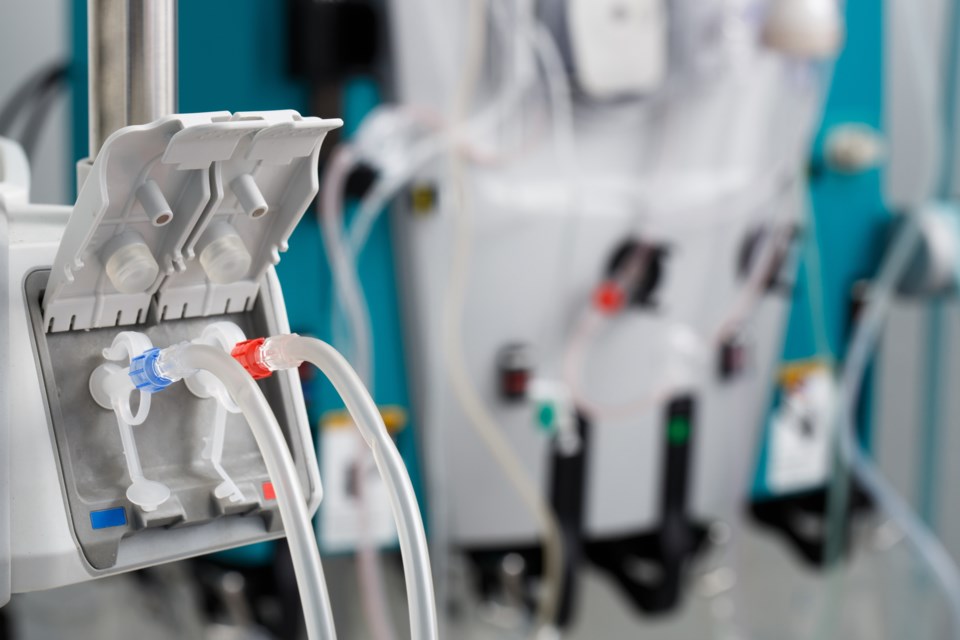First Person is a daily personal piece submitted by readers. Have a story to tell? See our guidelines at tgam.ca/essayguide.
I stare out the window at the office building across the street. I see people sitting at desks, typing on their keyboards, sipping coffee, and bustling about in their honeycombs of offices. I can’t help but feel envious of them, busy bees doing busy things. Living their lives.
I tune back into what my nephrologist is saying. “ … need to start dialysis in about a month or a month and a half.”
He’s explaining the next step for me now that my kidney function has declined to 7 per cent.
An overwhelming weariness descends on me. I have a genetic condition called polycystic kidney disease (PKD), which both my sister and I inherited from our father. PKD has been a giant black cloud hanging over me for much of my life. It has been a long, slow, steady decline that has involved hospital stays, lots of medication and dread – most of all dread – that one day I will end up on dialysis. And now that day has come.
I feel my usual feelings of anger, frustration and despair at having this disease but now I also have a feeling of desperation as well. Dialysis! Now that I must go on it, I know I need to reframe my idea of dialysis from a draconian method of dealing with kidney failure to a life-saving machine. Why haven’t they come up with something better and more innovative after all this time? All these decades? Where is the innovation? Why aren’t the Elon Musks and Bill Gates of the world working on this?
I did everything to not end up here. I took good care of myself. And last year, I made arrangements to receive a pre-emptive live kidney transplant before needing dialysis. This is no easy feat. There is currently no system in place to help you find one. That is why most people end up on dialysis and then on the deceased donor list, which you can languish on for years before you receive a kidney.
My live kidney donor – a family friend – had committed. She was completing the testing. I was sure that she was the one, that she was a match. She said she was in “110 per cent,” but after several months, she backed out without explanation. I was devastated. The testing process is lengthy here in Alberta – about a year for the kidney recipient and six to nine months for the donor. I was out of time to receive a pre-emptive live kidney and my nephrologist told me there were no other living donors available.
This is not for lack of trying. This past fall, my siblings hired a PR company to launch Kindred Kidney – an Instagram campaign to connect potential live donors with those who need a kidney. There’s a video about me telling people a little about myself and asking for a kidney. It is so hard to ask for a kidney. It is awkward and uncomfortable, and I’m not alone. Of the 4,043 Canadians on the waiting list for an organ transplant, 76 per cent of them are waiting for a kidney.
I can’t help wondering why the journey to get a kidney must be like this. I hope the next generation has a list of live donors willing to donate and doesn’t have to wait years on dialysis to receive a kidney from a deceased donor. I hope those who don’t qualify for a kidney have more appealing options than hemo or peritoneal dialysis. I hope … I hope.
I leave the nephrologist’s office and look for a taxi. I can’t wait to get home to make a cup of tea, hug my border collie, Samson, and forget this unhappy appointment, if only for a short while.
A taxi stops and I get in. On the way home, the driver – Ahmed – a soft-spoken man with kind eyes, and I get talking. I tell him about my need for a kidney and how I lost one I thought I was going to receive.
I tell him all about how stressful it’s been.
“I just want a normal life,” I said.
And that’s truly all I want. Just a normal life. I want to be like those office workers, going about my day, sharing a laugh with a colleague, thinking about my next task and what I’ll have for dinner that night. No dark cloud. No fear. No dialysis.
As I pay my fare and open the car door, Ahmed assures me, “The right kidney donor will come along for you. Do not lose hope.”
This gave me pause. I hadn’t thought of it that way before. For several months I’d been mourning the loss of the promised live kidney I thought I was going to receive. But as Ahmed pointed out, it was simply not the right kidney for me. So, it would not have worked out in the end.
This way of looking at it helps and brings me a little peace. I try to keep the faith that the right kidney will show up soon.
Judith Morrison lives in Calgary.



